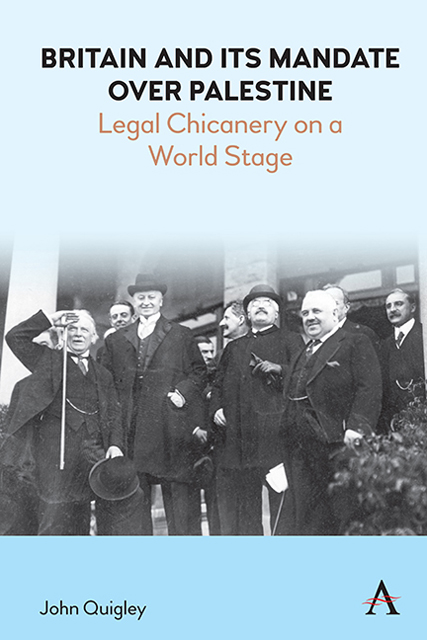Book contents
- Frontmatter
- Contents
- Preface
- Setting the Stage: Was Britain’s Rule in Palestine Legal?
- 1 The Balfour Declaration Is the Focal Point for the Legal Situation of Palestine
- 2 The Balfour Declaration Was a Binding Commitment to the Jewish People
- 3 The Jewish National Home Meant a Jewish State
- 4 The Balfour Declaration Was Issued to Affirm Jewish Rights in Palestine
- 5 The Paris Peace Conference Raised Jewish Statehood to the International Level
- 6 Britain’s Allies Made the Balfour Declaration an International Commitment
- 7 Britain’s Allies Endorsed Jewish Rights
- 8 Britain Took on Palestine Because of the League’s Mandate System
- 9 The League of Nations Protected Palestine’s Arab Population
- 10 Britain Was Given Palestine by the League of Nations
- 11 The League of Nations Put the Palestine Mandate into Legal Force
- 12 The Peace Treaty with Turkey Legalized Britain’s Status in Palestine
- 13 The Palestine Mandate Document Was a Treaty between Britain and the League
- 14 The League of Nations Required Britain to Implement the Balfour Declaration
- 15 The Palestine Mandate Document Implemented the League Covenant
- 16 The Palestine Mandate Document Recognized Jews as a National Group
- 17 The Palestine Mandate Document Bound Britain to the Balfour Declaration
- 18 The International Community Committed Itself to the Balfour Declaration
- 19 Britain Held Legal Status in Palestine
- 20 The United Nations Charter Carried Forward a Jewish Entitlement to Statehood
- Postscript: Why History Matters
- Documents Annex
- Notes
- Bibliography
- Index
1 - The Balfour Declaration Is the Focal Point for the Legal Situation of Palestine
Published online by Cambridge University Press: 10 January 2023
- Frontmatter
- Contents
- Preface
- Setting the Stage: Was Britain’s Rule in Palestine Legal?
- 1 The Balfour Declaration Is the Focal Point for the Legal Situation of Palestine
- 2 The Balfour Declaration Was a Binding Commitment to the Jewish People
- 3 The Jewish National Home Meant a Jewish State
- 4 The Balfour Declaration Was Issued to Affirm Jewish Rights in Palestine
- 5 The Paris Peace Conference Raised Jewish Statehood to the International Level
- 6 Britain’s Allies Made the Balfour Declaration an International Commitment
- 7 Britain’s Allies Endorsed Jewish Rights
- 8 Britain Took on Palestine Because of the League’s Mandate System
- 9 The League of Nations Protected Palestine’s Arab Population
- 10 Britain Was Given Palestine by the League of Nations
- 11 The League of Nations Put the Palestine Mandate into Legal Force
- 12 The Peace Treaty with Turkey Legalized Britain’s Status in Palestine
- 13 The Palestine Mandate Document Was a Treaty between Britain and the League
- 14 The League of Nations Required Britain to Implement the Balfour Declaration
- 15 The Palestine Mandate Document Implemented the League Covenant
- 16 The Palestine Mandate Document Recognized Jews as a National Group
- 17 The Palestine Mandate Document Bound Britain to the Balfour Declaration
- 18 The International Community Committed Itself to the Balfour Declaration
- 19 Britain Held Legal Status in Palestine
- 20 The United Nations Charter Carried Forward a Jewish Entitlement to Statehood
- Postscript: Why History Matters
- Documents Annex
- Notes
- Bibliography
- Index
Summary
In documentation it presented to the League of Nations, as we will see in more detail shortly, the British Government highlighted its 1917 statement, the Balfour Declaration. The Balfour Declaration plays a central role in the Narrative. It was highlighted as well in 1948, in a statement issued in Tel Aviv to proclaim a Jewish state in Palestine. That statement recited that in 1897, “the First Zionist Congress convened and proclaimed the right of the Jewish people to national rebirth in its own country.” The statement then continued, “This right was recognized in the Balfour Declaration of the 2nd November, 1917.”
A prominent Israeli jurist described the Balfour Declaration as the starting point for analysis of legal rights in Palestine. “From an international legal perspective,” wrote Yoram Dinstein, “the first step for any meaningful discussion of the Palestine Question is the Balfour Declaration of 2 November 1917.” The “Palestine Question” was the title of the agenda item for Palestine in documents of the United Nations, when it began dealing with the situation in 1947. Dinstein, long-time professor of international law at Tel Aviv University, was familiar with the work of the United Nations on Palestine, having served there in Israel's delegation.
The Balfour Declaration occupies a central place in the Narrative, as a font of Jewish entitlement claims in Palestine. It would, to be sure, be important in the subsequent history of Palestine. Only one sentence in length, it reads:
His Majesty's Government views with favour the establishment in Palestine of a national home for the Jewish people, and will use their best endeavours to facilitate the achievement of this object, it being clearly understood that nothing shall be done which may prejudice the civil and religious rights of existing non-Jewish communities in Palestine, or the rights and political status enjoyed by Jews in any other country.
This statement was made by Britain's War Cabinet, a small coterie of top officials that managed the conduct of the war against Germany and its ally Turkey. The statement came to be known by the name of the Secretary of State for Foreign Affairs, A. J. Balfour. Whether it should be the focal point for Palestine's status, analyzing from an international legal perspective, is not obvious.
- Type
- Chapter
- Information
- Britain and its Mandate over PalestineLegal Chicanery on a World Stage, pp. 9 - 12Publisher: Anthem PressPrint publication year: 2022

